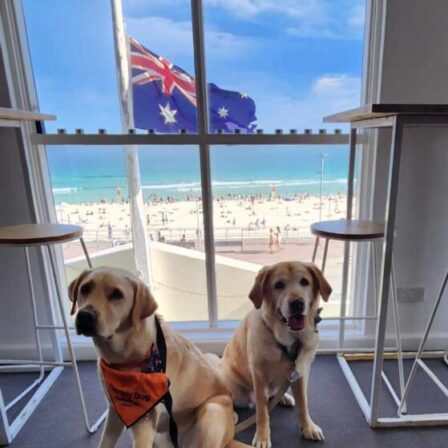News
Access All Areas
One in two Guide Dog handlers across Australia report they have been discriminately refused entry to a public place or service because of their Guide Dog in the past two years – some more than ten times. This is according to a new client survey by Guide Dogs Australia in the lead up to International Guide Dog Day (24 April).
Cafes and restaurants were the main offenders, with 71% of survey respondents reporting a refusal of entry; followed by taxis and rideshares (58%). Motels, theatres, office buildings and hospitals were named as other locations that handlers experienced discrimination.
In addition to outright refusals, an overwhelming 70% of handlers reported they have had to prove their legal right to enter with their Guide Dog, by showing an ID Card or by way of explanation, after initially being denied access.
In response, Guide Dogs Australia’s new advocacy and education campaign, Access All Areas aims to remind businesses, industries and the community that a person with their Guide Dog in harness is legally allowed to enter all public places. It is an offence to deny or charge a fee for the entry of a person with their Guide Dog.
“While the public generally do the right thing, Guide Dog handlers continue to face many barriers when going about their daily lives,” said Dale Cleaver, CEO of Guide Dogs NSW/ACT.
“Imagine how you’d feel if you weren’t allowed into a café or taxi, or told you couldn’t stay at a particular hotel? Guide Dogs are not pets. They are highly trained to open up the world for people who are blind or vision impaired, not close it down, which is effectively what denying access does.” Guide Dog handlers are being refused access to locations and services because of the very dog that is there to help them lead an independent life,” Mr Cleaver added.
The ongoing implications of refusals can leave Guide Dog handlers seriously inconvenienced – arriving late, missing out on events completely, or incurring cancellation/late fees. Worryingly, half of the survey respondents (48%) say they have changed their routines or avoid trouble areas as a result of refusals.
Guide Dog handlers also report being denied access leaves them feeling frustrated, angry, upset and humiliated, especially when in groups of friends.
Sixteen year old Ben Said has experienced numerous refusals and attempted refusals since being matched with his first Guide Dog, Jontie in August last year.
“Jontie has changed my life in so many positive ways and opened up a whole new world of independence. But it’s really disheartening and extremely frustrating every time I’ve been told I can’t take a rideshare, or can’t come into a café because I have my Guide Dog with me,” said Ben.
“It just makes me feel more disabled and basically like I’m being shamed.
“I’ve been refused by rideshare companies on several occasions now, where the driver has cancelled after I’ve told them I have a Guide Dog, or one driver even just drove off despite me explaining that it’s illegal to refuse me.
“I had a nightmare situation while on holidays on the Gold Coast. A bus company went out of their way to make it difficult for mum and myself – even our travel agent – to book us a ride. They claimed they’d have to check with every other passenger if they were allergic to dogs before they’d let us on board. In the end mum and I hired a car, adding a couple of hundred dollars to the cost of our trip.
“And pretty much on average once a week, I feel like I’m questioned by, or have to explain and educate staff at cafés and restaurants that it’s ok for me and Jontie to be there,” Ben added.
The majority of Guide Dog handlers surveyed (68%) believe a lack of understanding around Guide Dog access rights is the main reason they continue to experience discrimination, and that public education and greater accountability by key service industries is key to making a change.
To combat this, and as part of the Access All Areas advocacy campaign, Guide Dogs in NSW/ACT has partnered with the NSW Police Force to raise awareness of the illegal and finable offence of denying people with a Guide Dog access to public premises.
NSW Police Force Corporate Sponsor for Vulnerable Communities, Assistant Commissioner Max Mitchell, said police officers will respond to reports of discrimination from Guide Dog handlers and issue fines where appropriate.
“It’s a crime to refuse entry to a person with a Guide Dog,” said Assistant Commissioner Mitchell. “The NSW Guide Dog access laws have been in place for more than 30 years and like all forms of discrimination, there’s no excuse for it.”
To empower Guide Dog handlers to stand up for their rights, NSW Police and Guide Dogs NSW/ACT are re-issuing an updated ‘Guide Dog Access Rights’ card, outlining the relevant laws and fines. It states that NSW Police officers can issue on-the-spot fines of $330 and penalty notices of up to $1650 for refusing entry to a Guide Dog handler.
“It’s really worrying that so many Guide Dogs handlers are still being denied access, when this is a recurrent topic amongst our community awareness campaigns,” Assistant Commissioner Mitchell said.
Access All Areas – Guide Dogs Can Go Everywhere
- When a Guide Dog is in a harness, it is working and assisting a person who is blind or vision impaired to move around safely and independently. In NSW, a person with a Guide Dog in harness is legally allowed to enter all public places (except for an operating theatre and the zoo) under the:
- Disability Discrimination Act 1992 (Section 9)
- NSW Companion Animals Act 1998 (Sections 14 & 59)
- Australia New Zealand Food Standards Code (Chapter 3, section 24 (1) b).
- Public places include, shops and supermarkets, cafes and restaurants, pubs and clubs, hotels and motels, hospitals, medical practices and dental surgeries.
- Guide Dogs can also travel on all forms of public transport, as well as taxis and rideshares, and planes.
- It is an offence to deny or charge a fee for the entry of a person with their Guide Dog. NSW Police officers can issue on-the-spot fines of $330 and penalty notices of up to $1650 for refusing entry to a Guide Dog handler.
- A Guide Dog undergoes extensive training where it is taught how to behave in public areas. For example, when the Guide Dog is taken to a restaurant or café, it will usually sit under the chair or table its handler is sitting at, so it will not be in the way of staff or other patrons. Just like a regular restaurant or café patron, a person using a Guide Dog will not enter the food preparation area of a food service business. On transport, Guide Dogs are taught how to safely lead the person with vision impairment on and off the particular mode of transport, as well as how to behave in the vehicle while it is travelling.
Click here for more information on Guide Dog access rights.
ABOUT INTERNATIONAL GUIDE DOG DAY
International Guide Dog Day celebrates the important role Guide Dogs play in changing the lives of, and enabling people who are blind or vision impaired to be safe and independent in their communities. International Guide Dog Day is held each year on the last Wednesday of April.
There are currently 270 Guide Dog handlers in NSW and the ACT and Guide Dogs NSW/ACT is working hard to increase the number of dogs available, due to growing numbers of people having trouble getting around as a result of low vision.






